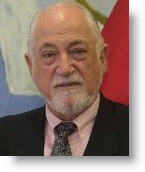 Peru’s Environment Minister Ricardo Giesecke said Monday that tackling social conflicts in the country will be an “urgent” task in his portfolio, state news agency Andina reported.
Peru’s Environment Minister Ricardo Giesecke said Monday that tackling social conflicts in the country will be an “urgent” task in his portfolio, state news agency Andina reported.
Social conflicts sky-rocketed during the Alan Garcia’s administration.
When Garcia took office in 2006, Peru’s ombudsman – the Defensoria del Pueblo – reported about 80 social conflicts in the country. Towards the end of his term, which wrapped up last Thursday, there were over 200 social conflicts, of which an overwhelming number are related to socio-environmental issues in the extractive industries.
In addition to delaying projects and investments, the conflicts have cost numerous lives and cost millions of dollars in collateral damage.
“What is urgent now is to try to deactivate, at the source when they arise, the conflicts that exist in the country at this moment,” Giesecke said.
The minister said President Ollanta Humala’s administration will need to push for approval of the prior consultation law. The bill was approved by Congress last year, but Garcia refused to sign it saying that it could provide communities with a veto right.
The legislation is intended to allow Peru to comply with article 6 of the International Labor Organization’s Convention 169, which requires the State to consult indigenous people prior to adopting administrative and legislative measures, as well as investment projects and development plans, that could affect their communities.
Giesecke said he would be open to having Peru’s National Water Authority, or ANA, transferred to the environment ministry. ANA is currently part of the Ministry of Agriculture. The Ministry of the Environment was created during Garcia’s administration to meet certain standards required under the Free Trade Agreement with the United States, but the government kept key areas, such as ANA and environmental impact studies of mining or oil production, in the relevant production ministries such as Agriculture and Energy and Mines.
Water is a central part of many of the socio-environmental conflicts. Community protests are frequently over concerns about pollution of local rivers and lakes by industry, in addition to worries about a lack of sufficient supply for agriculture.





